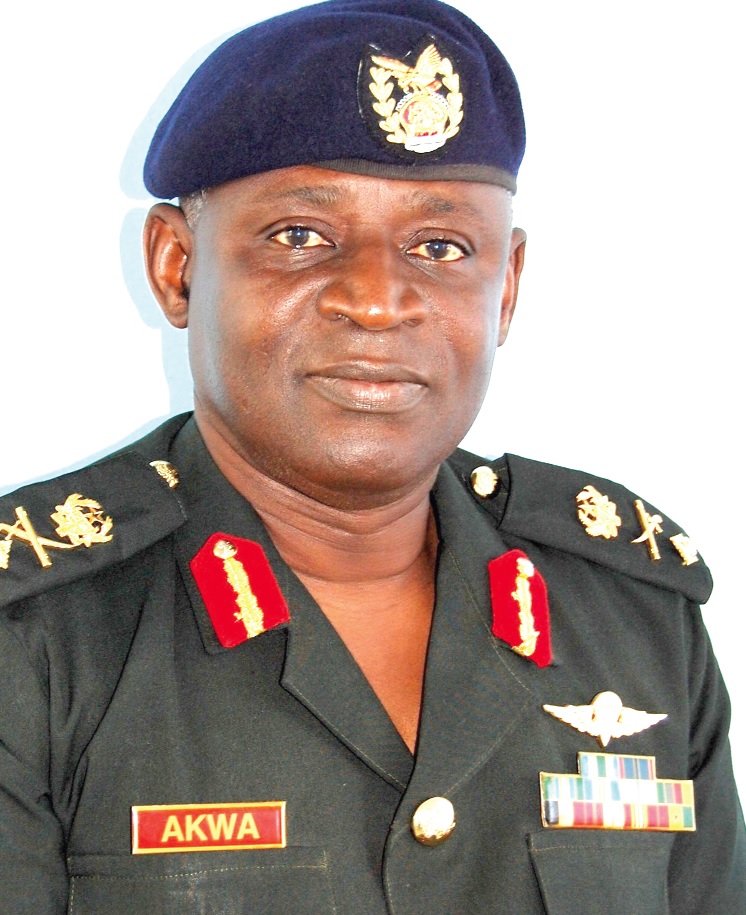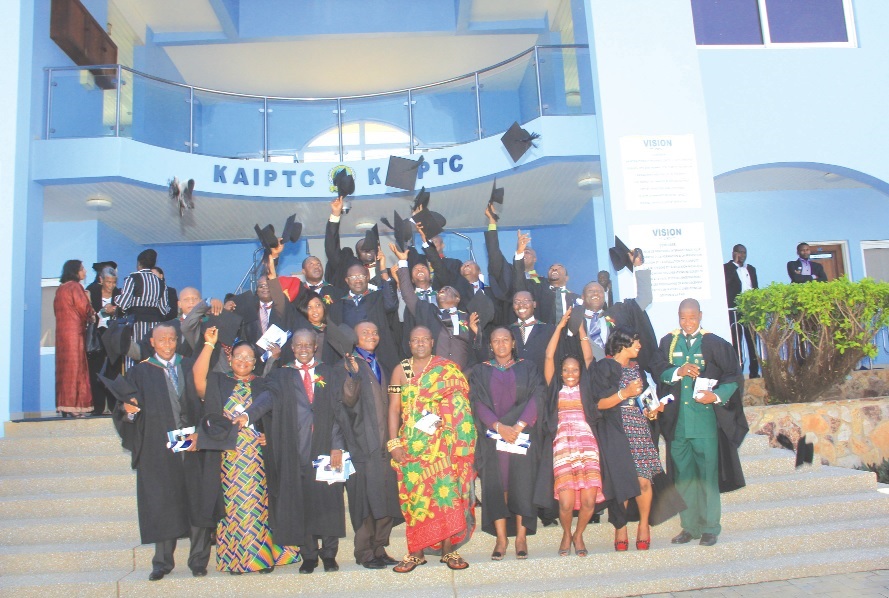KAIPTC: 10 years of excellent training in peace, security and conflict resolution
 After 10 years of its operations, the Kofi Annan International Peacekeeping Training Centre (KAIPTC) has grown to become one of the most respected peace and security institutions in the world.
After 10 years of its operations, the Kofi Annan International Peacekeeping Training Centre (KAIPTC) has grown to become one of the most respected peace and security institutions in the world.
Advertisement
For an institution to be adjudged 60th among the top 70 global security and international affairs think tanks in just 10 years of its existence is ample testimony of the huge stature of the KAIPTC in the realm of research, training and academic affairs.
These achievements did not come on a silver platter; they were made possible through the dedication and hard work of its management, staff, students and development partners.
The immediate past Commandant of the KAIPTC, Air Vice-Marshal Christian Edem Kobla Dovlo, who recently handed the baton to Brigadier-General Obed Boamah Akwa, described the management and staff of the centre as a ‘Dream Team’ who put in their best to make things happen.
“I’m not saying that it’s heaven on earth; no place is heaven on earth. But it’s a very good blend of military/police/civilians and academicians,” he remarked in an interview.
The assertion of Air Vice-Marshal Dovlo was corroborated by a graduate of the KAIPTC, Superintendent Abraham Acquaye of the Ghana Police Service, who extolled his alma mater as a centre of excellence and recommended it to anyone who was interested in peace and conflict resolution.
Birth of KAIPTC
In the 1990s, many West African countries had started boiling with civil conflict that extensively compromised the peace in the sub-region.
Many of the conflicts emanated from political disputes, struggle over ownership of natural resources, religious fundamentalism and social exclusion.
For nearly 10 years, Liberia was embroiled in a bitter civil war after Charles Taylor launched a Christmas Eve military attack on the government of Samuel Doe. Before that conflict could end, neighbouring Sierra Leone exploded into a bloody civil strife which threatened the peace and security of the subregion.
It is on record that it took the diplomatic and military effort of the Economic Community of West African States (ECOWAS), the sub-regional body, to douse the flames of war and restore peace and civilian democratic rule in the two countries.
Apart from these two major conflicts, the subregion also experienced various forms of military, political and civil conflicts in many countries, including Guinea-Bissau, Guinea, Cape Verde, Cote d’Ivoire, Mali and Togo. Ghana is among the few countries that escaped conflict on the magnitude as to draw international attention to the sub-region.
These, and the experience gained mainly by Nigeria and Ghana on peacekeeping operations in conflict zones in other parts of the world, including the Middle East, Bosnia, Namibia and East Timor, informed the political leadership to consider the establishment of an institution that would address peacekeeping not only as a military operation, but as a mechanism to predict and forestall potential conflict situations before they escalate into physical violence and the consequences of human and material loss and the dislocation of communities.
The institution so envisioned, was to prepare a cadre of military/police and civilian officers who would be better placed in their mediating role and at worst peacekeeping operations should the inevitable happen.
The idea of establishing the KAIPTC was, therefore, born out of the need for an institution that would build the requisite human resource capacity of West African countries to help address the emerging civil conflicts.
In May, 1998, Ghana’s Ministry of Defence (MoD) approved plans for the establishment of the centre, but it was not until four years later, in September 2002, that construction works for the centre started at Teshie in Accra.
By November 2003, the first phase of the project had been completed, paving the way for the beginning of the first course in that same month even before the official opening of the centre in January 2004.
The second phase of the project was completed in late 2005, while the third phase was completed in late 2011, bringing to shape, the full complement of one of the most beautiful landmarks in Ghana’s capital, Accra.
The attractive edifices and the clean environment radiate a peaceful ambiance necessary for a thorough research and training on matters of peace.
That is a true reflection of the slogan of the internationally acclaimed centre – “KAIPTC is where peace begins.”
The beauty and neatness of the buildings and the environment must have informed the perception of the centre as a military or United Nations (UN) facility, but Air Vice Marshal Dovlo says “it’s a lot more than a military or UN facility; the centre has a multi-dimensional mission”.
Vision and mission
The KAIPTC is founded on a well-defined vision and mission that clearly set it apart as a centre of excellence in peacekeeping research and training in Africa and beyond.
The vision of the centre is; “To remain an internationally preferred centre of excellence for research into and training for conflict prevention, management, resolution and innovative thinking into integrated peace support operations (IPSO)”.
In line with such a noble vision, the KAIPTC has a mission; “To develop and deliver internationally recognised and professional training courses and related programmes to equip personnel with selected skills and competences required to meet Africa’s present and future complex peace and security challenges”.
The vision and mission of the centre are driven by a set of strategic objectives, including the development of regional and sub-regional capacity in the delivery of IPSO and the enhancement of capacity for conflict prevention, management, resolution and peace building.
Other strategic objectives are to enhance the understanding of peace and security issues and to create an effective, efficient and sustainable management support arrangements for the centre.
Training courses
The KAIPTC offers programmes and courses that cover almost every aspect of integrated peace support training. Under its Conflict Prevention programme, the centre offers courses such as Development Diplomacy Peace and Security (DDPS), Negotiations, Rule of Law, Conflict Prevention and Election Management.
The centre also offers courses in Post-Conflict Reconstruction, which include Election Observation, Security Sector Reform, Small Arms and Light Weapons courses.
Other post-conflict reconstruction courses include Integrated Peace Support Operations (IPSO),Joint Campaign Planning, Civil/ Military Coordination, Disarmament Demobilisation and Reintegration, Crisis Information Management and Protection of Civilians.
Air Vice-Marshal Dovlo says KAIPTC has introduced courses in Governance and Democracy as part of its conflict prevention strategy, and the management of conflict emanating from natural resources.
Experiences from graduates
Supt Acquaye is a pioneer student of the KAIPTC after undertaking a Master of Arts degree programme in Conflict, Peace and Security.
Having emerged as the overall best graduating student of his year group, he is now a facilitator at the institute and the Police Training College in Accra.
Supt Acquaye says the course he undertook at KAIPTC has helped him in many ways and enhanced his teaching and learning as a facilitator.
“My training has actively enhanced my pedagogical and andragogical skills so far as teaching is concerned. It’s also broadened my horizon on conflict in general and how to resolve conflict,” he remarks.
Another graduate of the KAIPTC, Captain Francis Xavier Mwinsigteng of the Military Academy Training School at Teshie, says his training at the centre has impacted positively on his life.
“The course is one of the most outstanding academic programmes you can ever think of. It widens your scope when it comes to issues about conflict, peace and security,” he submits.
“I wish every Ghanaian will have an opportunity to pursue a course at the centre because they will know everything that brings disturbance, good governance and security issues.”
According to Captain Mwinsigteng, once people get to know about such issues, they will keep away from trouble making and advise others to live in peace.
Impact of KAIPTC
According to Air Vice-Marshal Dovlo, (the Immediate Past Commandant), the impact of KAIPTC on conflict prevention, management and resolution in the West African sub-region has been “extremely positive”.
Apart from being designated as the training centre for the establishment of the ECOWAS Standby Force, KAIPTC also works in close collaboration with the UN Peacekeeping Department to develop training courses.
Having established a very strong reputation as one of the best research institutions in Africa, Air Vice Marshal Dovlo believes the achievements of the centre in 10 years are good.
However, those achievements may not be desired much in the face of increasing and continuing civil conflicts in the sub-region.
The response of Air Vice Marshal Dovlo to such reservations is simple and straightforward, as he puts the blame squarely on the doorstep of politicians.
“The military never starts war; it is the politicians who start and can end war,” he contends.
In that regard, he submits, conflicts do not require military solution, but social and economic interventions, adding, “We provide the skills and knowledge for negotiations to resolve conflicts.”
Challenges
The KAIPTC like every institution, has a number of challenges that can undermine its laudable vision and mission.
One of the challenges is the centre’s over-dependence on development partners, including Denmark, Norway and Sweden, for its operations.
The implication is that any time any of these partners shut its doors to donor support for whatever reasons, operations at this international facility could be threatened.
This is why the immediate past Commandant said the centre was exploring ways of generating funds from internal sources, but beyond that effort, he suggests the need for ECOWAS to establish a Peace Fund to assist major training institutions that seek to address security problems.
Threat to peace
In spite of the impact of the KAIPTC in the prevention, management and resolution of conflicts in West Africa, Air Vice Marshal Dovlo is cautioning that there are some critical issues that threaten the peace in the sub-region.
He says what is currently happening in Nigeria regarding the activities of religious extremists is a great threat to peace in West Africa, as the instability could spread to other parts of the sub-region where governmental control is either weak or non-existent.
Air Vice Marshal Dovlo says many West African countries can now be described as fragile under the circumstance.
He observes that in the US, there is no worry when elections are due, but in West Africa, anytime elections are due, there is a great worry.
The recent discovery and production of oil in some West African countries, according to Air Vice Marshal Dovlo, also pose a serious threat to state stability in the sub-region unless it is properly managed.
Another source of threat to peace that worries the KAIPTC Commandant is the politicisation of every issue.
“We should be clear in our minds what are political and what are apolitical,” he advises, adding, “Politics is supposed to bring peace and development but if it is not handled very well, it can cause conflict”.
By Kofi Yeboah



